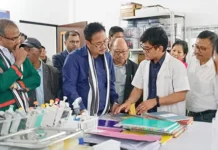[ By Ninong Ering & Abhishek Ranjan ]
This year has seen a turbulent few weeks, to say the least, when it comes to nature’s wrath people have faced in different parts of the country. Incessant rainfall, flash floods and the release of water by major dams have caused insurmountable damage to life and livelihood across river fed states such as Kerala and Assam.
It is safe to say that the unforeseen challenges anticipated as a result of the no longer subtle climate changes have arrived. Taking the specific example of the Brahmaputra River, the issue of climate change is also intricately intertwined with issues of international relations and diplomacy.
As the lower riparian state to the flow of water from the Tibetan plateau, we possess a natural disadvantage as we bear the consequences of natural and manmade disasters from contamination and construction. The unregulated flow of water, scarcity or abundance, is an additional element that poses a threat to the life and livelihood of the local population.
In light of these calamities, and those that are yet to occur, it is imperative for us to decisively move forward on national policies to combat such tragedies in the future in an organized and planned manner.
For starters it is worthwhile to remind ourselves that a national policy on Sedimentation Management is still in draft stages.
The policy outlines significant approaches to curbing the detrimental impact of artificial sedimentation by de-silting river basins, delineating flood plains with risk of flooding and erosion, regulation of the quality of materials being used in industry and manufacturing close to rivers, safe grassland and river management practices, etc.
This policy needs to be formalised and established as soon as possible to ensure that rivers management and conservation is facilitated by an accountable, national body responsible for the health and survival of our rivers. This becomes even more significant in light of the fact that our depleting groundwater resources cannot hope to serve the water needs for our billion strong population.
Formalization of such a strategy, combined with efforts to undertake systematic research into the natural resources of the area and develop a contextual conservation strategy. This strategy would be better informed through a consultative process involving key stakeholders from government bodies, research institutions, academics, activists, local leaders and bureaucrats.
A consultative process for a local conservation policy would be able to highlight the needs of the populations in the different targets areas for such a policy. These findings, shared on national and international platforms could bring much needed attention to an urgent concern around the country.
Besides a national policy to promote improved safeguarding practices for our rivers, we also need to revisit the idea of joint/collaborative efforts with our neighbours in terms of research and biodiversity conservation.
In the case of the Brahmaputra River, which runs through three countries and provides a source for life and livelihood of some of the most densely populated regions on Earth, we realise that physical boundaries fail to account for our shared geography and climate. A particular Himalayan ecosphere is home to a unique ecosystem of endangered species of flora and fauna that rely on the existence of this ecosystem to survive. This ecosystem in turn feeds into the climate and lives of the many Himalayan countries and populations that call it home. Protecting this fragile ecosphere from exacerbating climatic conditions can only successfully be undertaken collaboratively.
Joint efforts by academics and activities in India, China, Nepal, and Bhutan to understand and find the best practices to protect this ecosphere in the regional context will be crucial to check the damage that has been inflicted upon this ecosystem, and begin restoring it.
Sustainable development efforts in all other sectors will be futile if this basic need of our environment remains unfulfilled. (Ninong Ering is Arunachal East MP and Abhishek Ranjan is a policy analyst)


